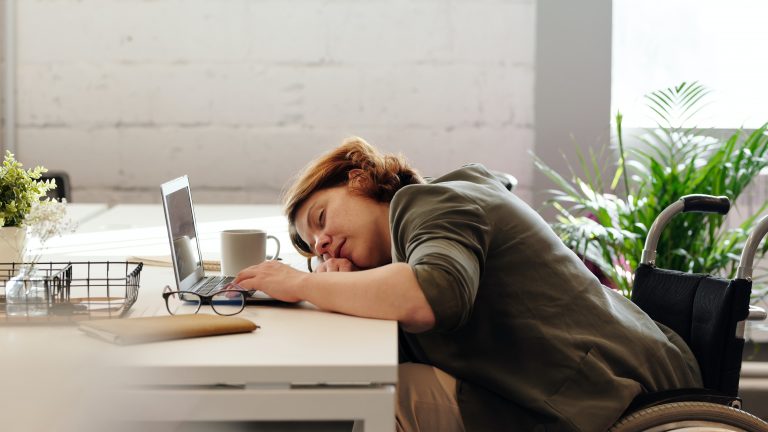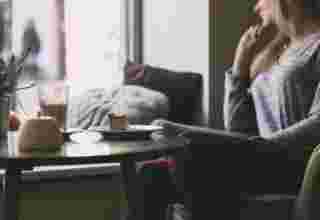
Forty-two percent of Americans start feeling tired as early as noon, according to new research.
The survey looked at the daily habits of 2,000 Americans and found 65% said they rarely wake up feeling rested and energized.
And this daytime tiredness negatively affects 74% of respondents’ productivity.
Conducted by OnePoll on behalf of RestoreZ, the survey found that nearly half of respondents point the finger at not sleeping enough, closely followed by not sleeping deeply enough.
And when respondents don’t get enough sleep they’re left feeling out of focus and unmotivated.
Nearly half of respondents also said a lack of sleep puts them in a bad mood, while three in 10 admitted to getting snippy and losing their patience.
A quarter of respondents even said a lack of sleep contributes to poor decision making.
With all of these negative impacts, it’s no wonder that 64% of respondents said they have trouble sleeping when their daily routine is thrown off.
Having a solid nighttime routine is crucial for 83% of those surveyed to properly wind down the day – and over half watch TV as they start getting ready to head to bed.
Other parts of respondents’ nighttime routines included taking a bath or shower and checking to make sure their doors are locked.
Thirty percent of respondents also wind down for the night by meditating or exercising.
Despite these routines, however, only 37% of respondents are dedicated to a consistent sleep schedule where they go to bed and wake up at the same times every day.
A quarter of those surveyed even said their bedtimes and wake up times vary on a daily basis.
“Most people who are tired during the day and who wake feeling unrested think they have a sleep problem, but really they have a circadian rhythm problem,” said Jennifer Cooper, Chief Scientific Officer at RestoreZ.
“Our modern lifestyle is at odds with century-old programming built into our DNA that is designed not just to synchronize our sleep patterns, but also coordinates many other important functions in the body. One of the most important things we can do to strengthen our innate circadian rhythm is to have a bedtime routine that includes going to bed and waking up at approximately the same times each day.”
With this lack of consistency, it’s not surprising that 27% of respondents have trouble falling asleep and 34% have trouble staying asleep.
And in order to remedy their sleep issues, 28% of those surveyed said they’ve tried herbal remedies and 26% have turned to over-the-counter medications.
Twenty-three percent of respondents also said they’ve tried melatonin and even prescription sleep medication in the hopes of improving their sleep.
“Poor sleep isn’t the real problem, it is just the most common symptom of chronic circadian dysfunction,” added Cooper. “The best way to get great sleep is to strengthen and reinforce your natural circadian rhythm.
“Many of the most common sleep aids just treat the symptom of sleeplessness by knocking us out and actually further desynchronize our circadian rhythm. This is why there are so many side effects associated with drugs that promote sleep.”
TOP PRODUCTS TRIED TO IMPROVE SLEEP
-
Herbal remedies – 28%
-
Over-the-counter medications – 26%
-
Melatonin – 23%
-
Prescription medication – 23%
-
Meditation apps – 19%
-
A special pillow – 17%
-
A new mattress – 17%
-
A mask – 16%
-
Ear plugs – 16%
-
A noise machine – 15%
-
New sheets – 14%
-
Blue light blocker – 13%
TOP 10 NEGATIVE IMPACTS FROM NOT GETTING ENOUGH SLEEP
-
Mood – 47%
-
Mental focus – 44%
-
Lack of motivation – 34%
-
Work performance – 33%
-
Immunity – 32%
-
Less patience – 31%
-
Relationship strain/stress – 28%
-
Poor decision making – 25%
-
More likely to eat unhealthy – 23%
-
Indigestion – 16%
AMERICA’S NIGHTTIME ROUTINE
-
Watching TV – 57%
-
Taking a bath/shower – 44%
-
Checking to make sure the doors are locked – 44%
-
Skincare routine – 41%
-
Eating a snack – 34%
-
Reading a book – 32%
-
Meditating – 31%
-
Exercising – 30%
-
Picking their outfit for the next day – 28%
-
Putting away their digital devices – 25%
-
Taking their dog for a walk – 20%
-
Taking out the trash – 19%
-
Packing their lunch for the next day – 19%
-
Writing in a journal – 19%
-
Taking a walk – 16%



















